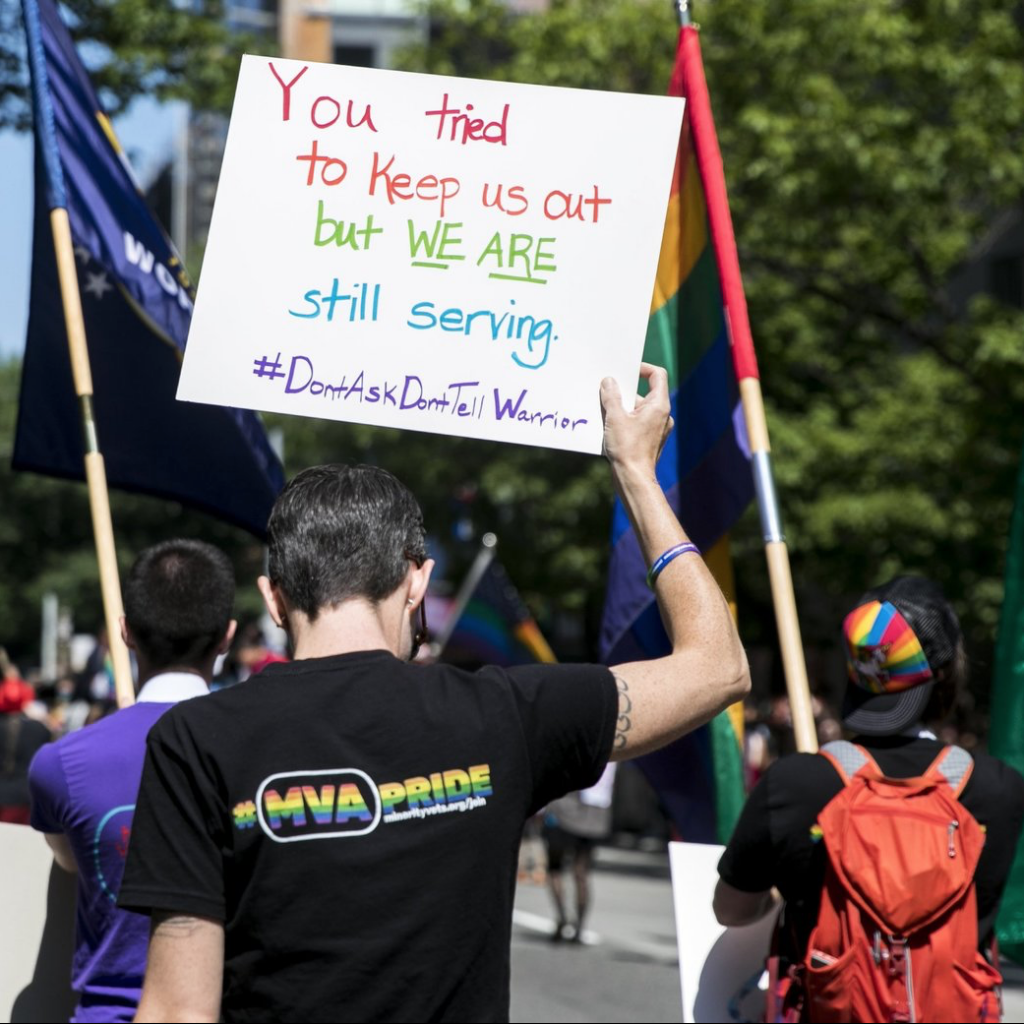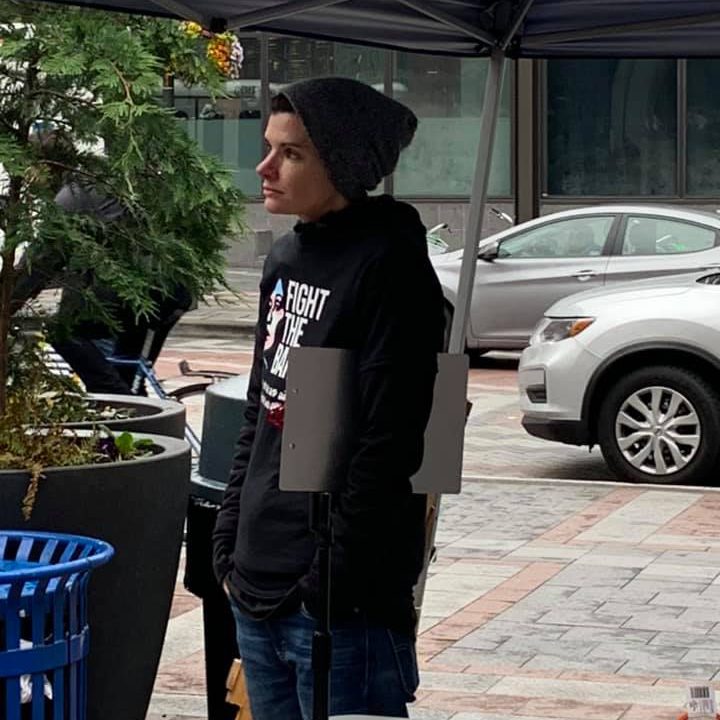by Lindsay Church

I came out of the closet in 2003, a few months after I graduated high school. Before coming out, I remember walking the halls of my high school and being taunted by football players who would hurl their favorite nicknames at me that included “butch”, “dyke”, and other creative names they would come up with that reminded me that I was different. As I came out, I was terrified of how my family and friends would react. If the way I was treated before I came out was any indication of how it would go, I was terrified that I would end up living my life feeling empty, alone, and different in a way that society could not accept.
Before coming out, I had decided to follow in my family’s footsteps and join the Navy. I was set to leave just under a year after graduating to become a Cryptologic Technician Interpretive. As I learned more about myself, I began to realize that I was queer and that this wouldn’t work if I was going to serve under Don’t Ask, Don’t Tell. At this point, I decided it was more important to better understand who I was as a human before I volunteered to keep myself in a closet. I decided not to go.
In 2004, I attended my first Pride parade. It was the first time that I had been surrounded by so many queer people and didn’t feel judged for my own sexual orientation and gender diversity. I remember feeling so excited and like I didn’t quite fit in yet, but that I would. I spent the next few years wandering the civilian world, searching for my sense of purpose and for something that would satisfy the void that I felt deep inside myself.
Years later, I decided to serve despite the fact that it meant voluntarily stepping back into the closet in the name of serving my country. While serving, I struggled with feelings of guilt. While I felt a deep sense of pride for serving my country, I also felt I had turned my back on the LGBTQ community in a time of turmoil. The shame I felt in both my military world for being queer and my queer world for serving under Don’t Ask, Don’t Tell are things that I still struggle with today.
As we kick off LGBTQ Pride month 2019, I can’t help but reflect on the very first “Pride” that happened just 50 years ago at the Stonewall Inn. The start of the Gay Liberation Movement wasn’t a parade as we know it today, it was a riot. On June 28 and 29, 1969, a group of LGBTQ activists, headed by trans women and gender diverse folks, fought back against the routine police raids of gay bars throughout New York City.
While the Stonewall Riots were only two nights, the action itself fueled the Gay Liberation Movement that gave birth to the LGBTQ Rights Movement that we know today. This movement has profoundly impacted the military that so many of us served under.
Without the LGBTQ Rights Movement, the military would still be discharging queer service members as “sexual psychopaths.”
Without the LGBTQ Rights Movement, we would not have seen the day Don’t Ask, Don’t Tell was implemented to allow queer service members to serve if they could remain closeted.
Without the LGBTQ Rights Movement, we would not have seen the end of the era of Don’t Ask, Don’t Tell and open service for LGB individuals.
Now in 2019, we are seeing the rights that were gained through the pain of the last 50 years roll back. Where 2016 marked the beginning of open transgender military service, 2019 was the introduction of the Transgender Military Ban.
It’s important to remember that without the LGBTQ Rights Movement, we will not see the end of the Transgender Military Ban.
For decades, we have walked the streets of cities around this country and the world, celebrating our right to exist. We have celebrated, by the millions, the rights that we have earned through the sacrifice and fight of those who came before us. We have celebrated the end of “Don’t Ask, Don’t Tell,” the introduction of workplace protections in many states, marriage equality, adoption rights, and more. The moments when we gained these rights are moments that continue to live through each of us. We have had a lot to celebrate.
While I’m all for a good parade and a chance to celebrate queerness, this year feels different. Where I normally feel a certain level of excitement and lower levels of vigilance in the streets of Seattle, I can’t help but recognize the communal suffering for the regressions that have happened in and to our community. While fear has always been a persistent factor in many queer folks’ lives, it has recently seeped into every pore of our community, from the rise of everyday homophobia to the Pulse nightclub shooting.
This year, for me and many leaders in the LGBTQ community, Pride is not a parade, it is a march.
In the military, we are familiar with marches, it is how we go to battle. This Pride month and in the months beyond, we prepare for the battle of our lives – the one for our rights and the safety of ourselves and our families. There has never been a battle that has meant more for the LGBTQ community.
As our trans siblings in arms serve under Don’t Ask, Don’t Tell 2.0, as we watch our rights be challenged by legislation and lawsuits, and as we feel the constraints of a society that has grown less and less accepting of our community, it is our time to fight. Our futures – our collective futures – rely on the outcomes of our actions today.
This Pride month, let’s focus on building radical love for, and among, our LGBTQ veteran community. Too often people do not remember the power of our community and its members. If leaders like Harvey Milk, an LGBTQ Navy veteran, can leave the service and go on to lead in the Gay Rights Movement, we too can lead our community to a brighter future for all of us.
Are you ready to build a brighter future? Join us at minorityvets.org/join.

During Operation Desert Storm aboard the flagship USS Ranger if I left the forward mess deck exiting to the starboard head (restroom) I could get a blowjob in a minute, just by tapping my foot. If I were suspected as gay and exited to the port side I could get thrown overboard. I smuggled my feelings into a book called Military Secret. I had to leave the Navy to publish, or they would have made my life hell. I had signed orders for Navy Recruiter Training Command at Pensacola Florida, followed by (also signed) orders For Duty at Honolulu, Hawaii. I gave them up to publish my book. You have never heard of my book, but it sits on the library shelves of the US Naval War College, US Naval Academy, and even Harvard University. So if you want to you can find it under the title “GULF in the WAR STORY” wherever books are sold.